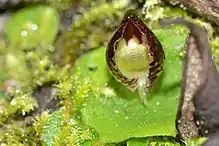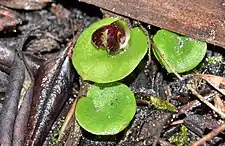| Tiny helmet orchid | |
|---|---|
 | |
| Corybas despectans growing near Albany | |
| Scientific classification | |
| Kingdom: | Plantae |
| Clade: | Tracheophytes |
| Clade: | Angiosperms |
| Clade: | Monocots |
| Order: | Asparagales |
| Family: | Orchidaceae |
| Subfamily: | Orchidoideae |
| Tribe: | Diurideae |
| Genus: | Corybas |
| Species: | C. despectans |
| Binomial name | |
| Corybas despectans | |
| Synonyms[1] | |
Corybas despectans, commonly known as the tiny helmet orchid[2] or sandhill helmet orchid[3] is a species of terrestrial orchid endemic to southern Australia. It has round or heart-shaped leaf and a tiny reddish purple flower. Unlike many others in the genus, the dorsal sepal does not cover the labellum. It is similar to C. incurvus but the flowers are smaller.

Description
Corybas despectans is a terrestrial, perennial, deciduous, herb with a single round or heart-shaped leaf 8–25 mm (0.3–1 in) long and 12–30 mm (0.5–1 in) wide. The leaf is green on the upper surface and silvery green on the lower side. There is a single erect, reddish purple flower with green or translucent areas, 7–12 mm (0.3–0.5 in) long and 9–11 mm (0.35–0.43 in) wide. The dorsal sepal is greenish grey, erect in the lower part then curves, 6–11 mm (0.2–0.4 in) long and 3–4 mm (0.1–0.2 in) wide and does not usually completely cover the labellum. The lateral sepals are about 5 mm (0.2 in) long, 1 mm (0.04 in) wide and joined at their bases before tapering to a fine tip. The petals are about 2 mm (0.08 in) long, 1 mm (0.04 in) wide, widest at the base then tapering to a thread-like tip. The labellum is longer than the dorsal sepal, 7–8 mm (0.28–0.31 in) long, 9–11 mm (0.35–0.43 in) wide and reddish with obvious veins. Flowering occurs from June to September.[2][3][4][5][6]
Taxonomy
Corybas despectans was first formally described in 1976 by David Jones and R.C. Nash from a specimen collected near Warooka and the description was published in Muelleria.[7] The specific epithet (despectans) is a Latin word meaning "look down upon".[8]
In 2002, David Jones and Mark Clements proposed splitting Corybas into smaller genera and placing this species into Corysanthes but the change has not been widely accepted.[9]
Distribution and habitat
The tiny helmet orchid forms colonies in forests and scrubland and is very common in some places. It occurs disjunctly in western Victoria and on the Mornington Peninsula, in the south-east of South Australia including Kangaroo Island and in Western Australia between Bunbury and Israelite Bay.[2][3][6][10]
References
- 1 2 "Corybas despectans". World Checklist of Selected Plant Families (WCSP). Royal Botanic Gardens, Kew.
- 1 2 3 Jones, David L. (2006). A complete guide to native orchids of Australia including the island territories. Frenchs Forest, N.S.W.: New Holland. p. 170. ISBN 1877069124.
- 1 2 3 Brown, Andrew; Dixon, Kingsley; French, Christopher; Brockman, Garry (2013). Field guide to the orchids of Western Australia : the definitive guide to the native orchids of Western Australia. Simon Nevill Publications. p. 172. ISBN 9780980348149.
- ↑ Jones, David L.; Nash, R.C. (1976). "A new Corybas species from South Australia". Muelleria. 3 (3): 165–167. doi:10.5962/p.171919. S2CID 251005393. Retrieved 7 May 2018.
- ↑ Jeanes, Jeff. "Corybas despectans". Royal Botanic Gardens Victoria. Retrieved 7 May 2018.
- 1 2 Hoffman, Noel; Brown, Andrew (2011). Orchids of South-West Australia (3rd ed.). Gooseberry Hill: Noel Hoffman. p. 277. ISBN 9780646562322.
- ↑ "Corybas despectans". APNI. Retrieved 7 May 2018.
- ↑ Brown, Roland Wilbur (1956). The Composition of Scientific Words. Washington, D.C.: Smithsonian Institution Press. p. 398.
- ↑ Jones, D.L. (2002), "Nomenclatural notes arising from studies into the tribe Diurideae (Orchidaceae)", Orchadian, 13: 436–468
- ↑ "Corybas despectans". FloraBase. Western Australian Government Department of Biodiversity, Conservation and Attractions.